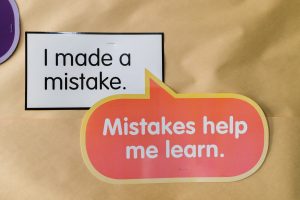
(Unsplash – Ju Desi)
All educators want the best for their students and to see them succeed in their endeavours, and one of the most important factors that affect them is their mindset.
The concept of having a growth mindset has become increasingly common in society, including in education. However, many students do not really understand what a growth mindset is or how to build one.
Thus, this is where your role as an educator comes in; you will have to guide them along the way and help them apply this mindset to their lives. If you are unsure of how to start, here are 5 ways that we have come up with to help you!
What Is a Growth Mindset?

(Unsplash – sydney Rae)
Before we move on to the methods, it’s crucial to first fully understand what a growth mindset really means.
A growth mindset is the complete opposite of a fixed mindset. And when a student has a fixed mindset, they think that they cannot further change or improve themselves.
They believe that any abilities, talents, and intelligence that they have cannot be developed as they were just born with them. They tend to find it meaningless to try out new things and, more often than not, see others’ successes as threats.
A student with a growth mindset, on the other hand, constantly seeks opportunities to learn and further develop their skills and who they are. They are not afraid of making mistakes and see challenges in a positive light. Furthermore, they celebrate others’ successes and are very receptive to feedback.
Now that we fully understand what a growth mindset is, let’s dive into how you can instill it in your students!
Normalise Making Mistakes

(Pexels – RDNE Stock project)
In the educational world, students face huge amounts of pressure and expectations in order to score good grades on their graded assessments and secure a good future.
Therefore, they are constantly trying to achieve perfection in whatever they do and avoid making mistakes like the plague. However, that is very unrealistic and unhealthy for their learning.
During lessons, assure them that it’s okay when they make mistakes, and you may even encourage them to do so. Mistakes aren’t just opportunities for your students to learn; neurological research shows that they also help the brain grow.
Reinforce the idea that they should focus more on the learning process itself and the effort that they put in instead of just the end result.
You may even bring up examples of famous individuals, such as Thomas Edison, who faced failure but ultimately succeeded through sheer perseverance and determination.
Developing a Culture of Perseverance

(Unsplash – Brett Jordan)
Perseverance is a huge part of building a growth mindset. It is the idea of continuously trying over and over again to overcome a problem, no matter how difficult or taxing it may be.
You can provide them with challenges of different types and get them to solve them by themselves without you giving them direct answers. Guide them slowly to think critically and explore different solutions to the problems.
When it gets too difficult for them, encourage them to break down the problem into manageable steps as well as celebrate any progress that they have made.
Doing this will motivate them to persevere longer when faced with challenges, increase their creativity and critical thinking, and encourage them to embrace those challenges instead of shying away from them.
Provide Constructive Feedback

(Pexels – Towfiqu barbhuiya)
Offer specific and constructive feedback that focuses on effort, strategies, and improvement rather than solely on the end result. Highlight areas where students have shown growth and identify areas for further development.
Also, allocate some time for their self-reflection by asking them to assess their own progress and identify what went well and what can be improved.
When your students acknowledge constructive feedback and self-reflection as tools to help them grow, they will be more open and motivated to put in the effort to tackle challenges.
Reflection Journal

(Pexels – Jess Bailey Designs)
On top of just conducting self-reflections after each challenge, it is good to get your students to have their own reflection journals.
You could either purchase in bulk for them or you could get them to purchase on their own since they may prefer more personalisation for their journals.
When it comes to reflection, students may be overwhelmed, as they may either be avoidant of their thoughts and feelings or there are too many of them to reflect on and write down at once.
Therefore, we suggest getting them to write down their thoughts and feelings once at the start of the lesson and once at the end. This is so they can break them down easier and go more in-depth with their reflections.
Model a Growth Mindset

(Unsplash – Centre for Ageing Better)
As an educator yourself, the most important thing is to be a good role model for your students to follow.
After all, students who have positive role models are more likely to pick up habits and perspectives from those they look up to. Demonstrate what a growth mindset is through your actions and words.
You could also share your experiences, if you have any, about how you overcame your own challenges. Being a good role model for your students will create a nurturing environment and instill the habit of building a growth mindset in them.
Conclusion

(Pexels – George Pak)
It’s best to implement these ways as early as possible throughout your tutoring sessions for them to be more effective and not be viewed as too drastic.
By teaching your students several concepts and equipping them with the skills and perspectives of a growth mindset, you are helping them transition from having a fixed mindset to lifelong learning and success!
